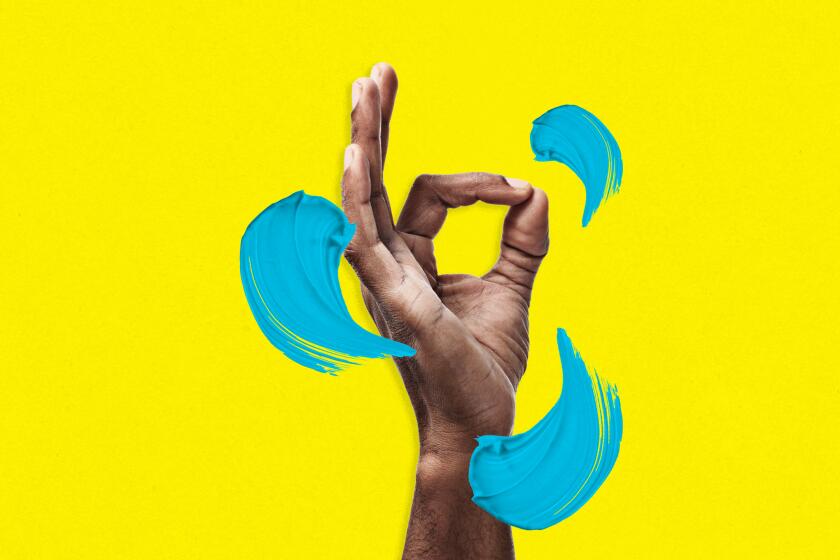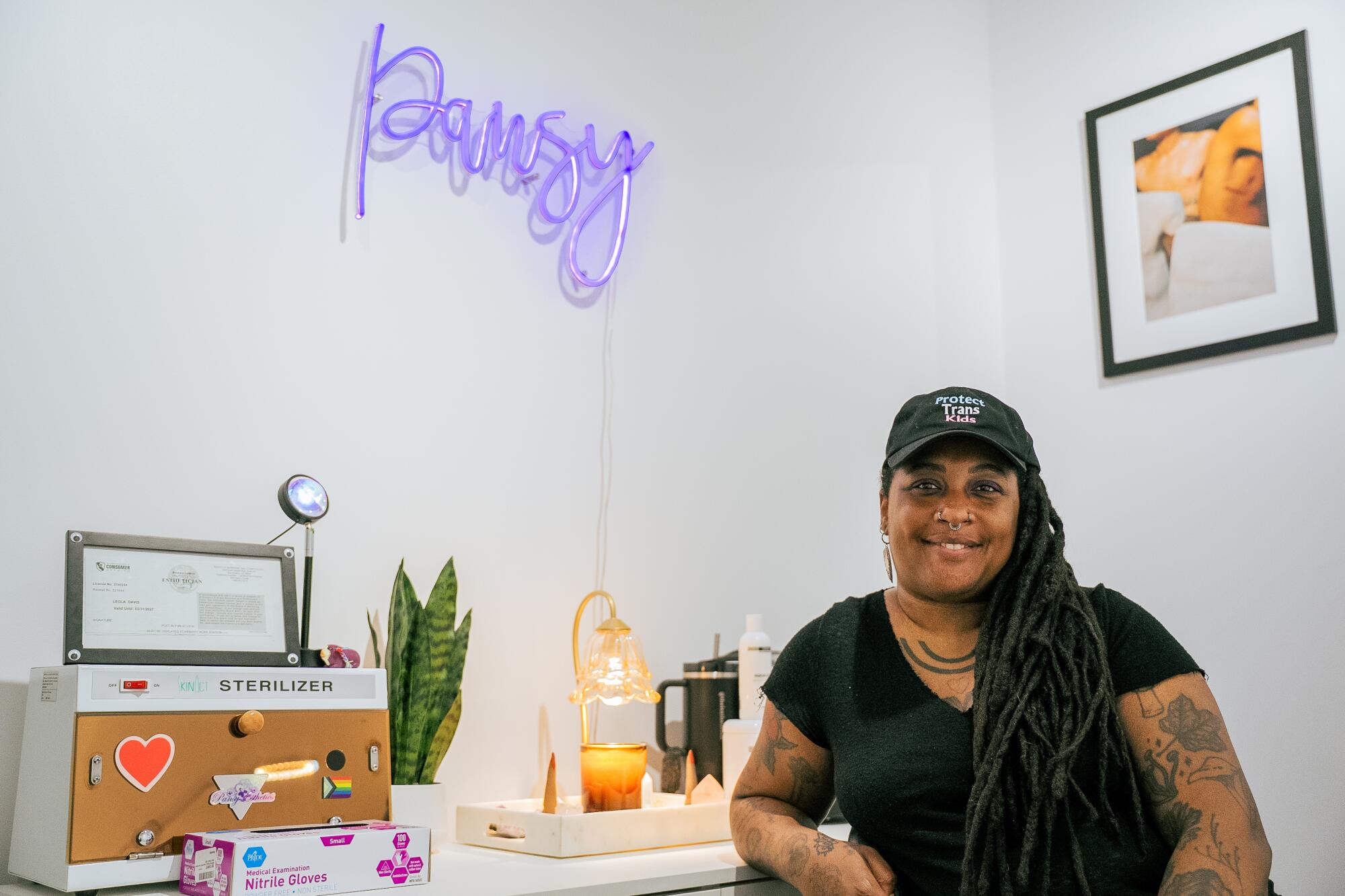
- Share via
- Leola Davis runs Pansy Esthetics, one of the few skincare providers in L.A. that caters to transgender people and nonbinary people post-operation.
- The lack of inclusive care sparked Davis’ desire to expand access to facials and other skincare services for people of color and trans people.
- In a time when trans rights are under attack, Davis sees her work as an important part of community care.
As Emmett Preciado lay back on a massage table, a halo of light circled his bare torso as Leola Davis brushed soapy water on faint red lines under his nipples. In the darkened room of this small West Hollywood studio on Santa Monica Boulevard, the bed is Davis’ healing altar, her hands offering sacred care.
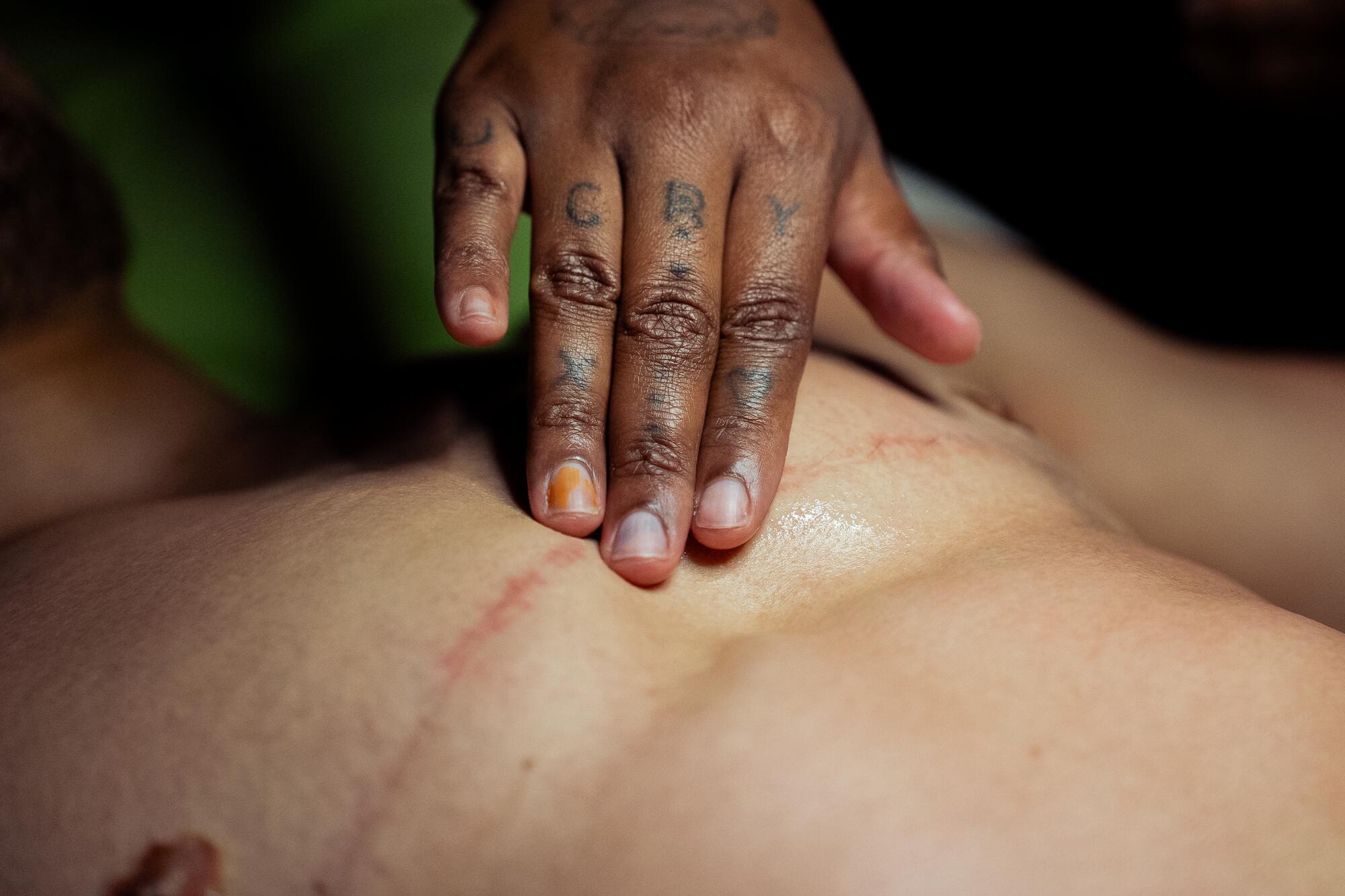
“It’s extremely intimate,” said Davis, a queer licensed aesthetician who specializes in facial treatments and post-surgery aftercare for transgender people and nonbinary people. Oftentimes, she’s the first person to touch a client’s chest after they’ve had surgery. “I want people to feel loved and cared for when they come in here.”
At her workstation, Davis is casually dressed for comfort in black sweats and a T-shirt — it makes it easy for her to move around in a profession that requires her hands to be free at all times. In trans pride colors, her baseball cap reads, “Protect trans kids.”
Along with boozy drag brunches and dancing at the Pink Pony Club, partake in L.A.-area activities and events this Pride Month that serve as a lifeline for queer community and creativity.
Davis, 40, is a self-described late bloomer in the skincare industry. She moved to Los Angeles from Seattle in 2018 to be with her girlfriend and worked as a bookseller at Book Soup for almost two years before she had her first facial in 2019 — an experience that changed the trajectory of her life.

In sharing her facial experiences with her friends, Davis realized that a lot of her community — queer people, trans people and people of color — had never had a facial. She wanted to do something about it and started aesthetician school in December 2019.
“This industry is geared so much towards white, cis, thin women,” Davis said about the beauty sector. When Davis, a cisgender Black woman, decided to start Pansy Esthetics in 2021 she had been thinking about the communities that are often left out of narratives surrounding mainstream beauty standards. “Everything that went into my business was, ‘How can I make this accessible for as many people as possible?’” she said.
Davis went to school specializing in acne treatments for the face and quickly found that much of that knowledge translated well for healing scar tissue for trans people who have had facial feminization or chest masculinization surgery. To address scars, Davis uses treatments invented by Danné Montague-King, a gay man and cosmetic chemist who developed a line of skincare products designed to treat hyperpigmentation from acne scars.
But it took Davis a while to figure out how to craft an inclusive regimen because she wasn’t finding any guidebooks or training for aestheticians on how to treat people who’ve had gender-affirming surgery. Even in treating dark-skinned people, she found aesthetician school to be sorely lacking in offering knowledge.
Beauty experts says stress and lack of sunlight during the COVID-19 era can play a role in how your skin looks. Here are DIY solutions to make it look better.
“You can’t use certain types of lasers on darker skin,” Davis said of people using laser treatment for hair removal. People of color also pigment more easily when their skin is damaged. “A lot of aestheticians don’t continue their education on treating brown skin outside of school, and it’s very apparent in the treatment room.”

It took time, but as a one-woman band, she’s built a roster where she sees about 20 clients a week who come in for two-hour sessions. She’s also selling courses on how other aestheticians can learn to treat transgender people. It’s still such a rarity in the skincare industry that one person is flying from the United Kingdom to L.A. for Davis’ services.
Preciado, a model and actor who has appeared in “Good Trouble” and other Hollywood projects, is one of her regular clients. He comes for treatment to fade pigmentation on his decade-old top surgery scars and treat the keloids along his left forearm where doctors took a skin graft and nerve for his phalloplasty in 2019.
He said that the DMK alkaline washes have been so effective that his scars have softened in his arm and nearly faded on his chest.
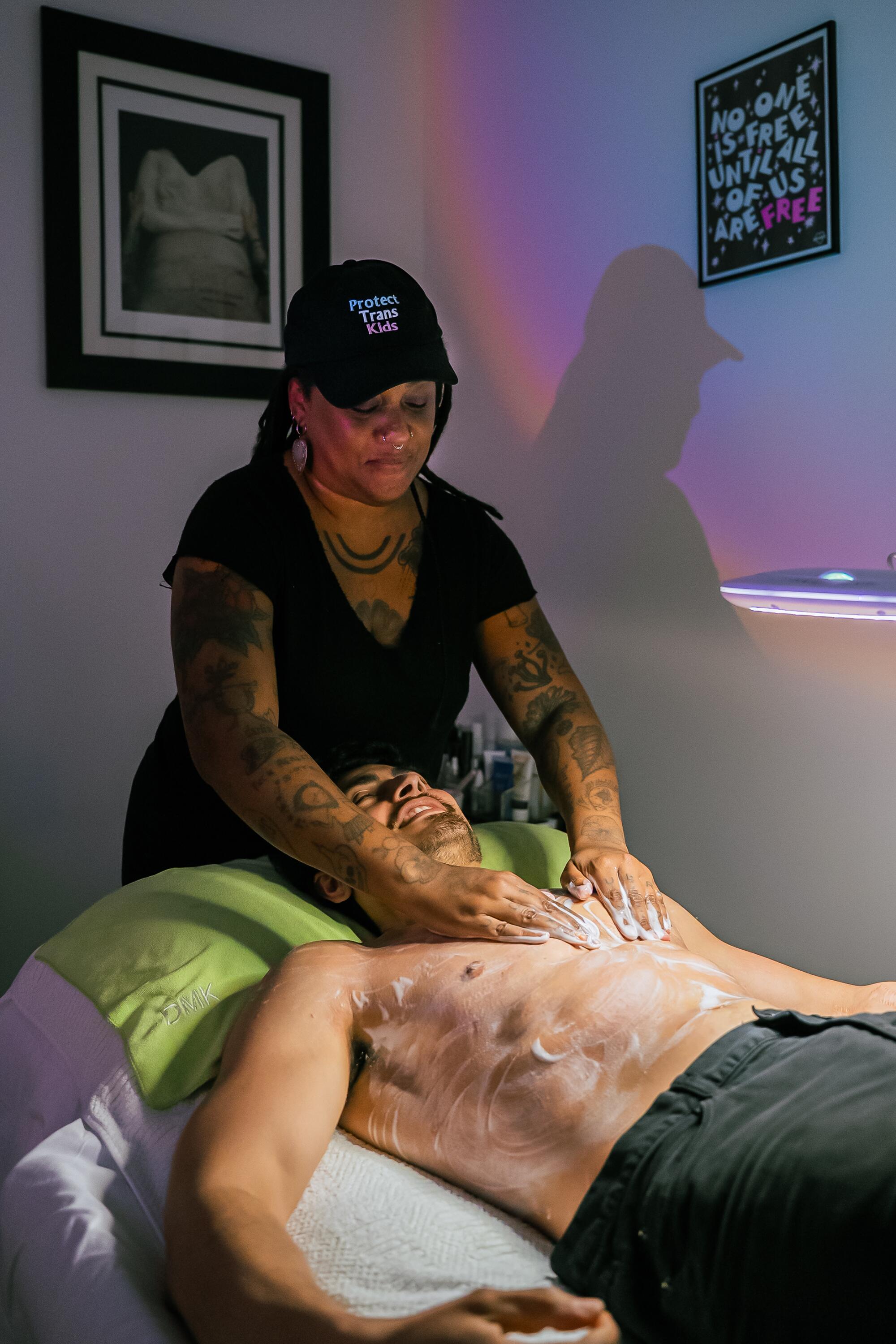
“After our treatments, I was like, “Wait a second. I think I want to stop because I don’t want them to completely fade and disappear,’” said Preciado, who is proud of his journey as a transgender man and shares his story with thousands of followers on Instagram. But under the Trump administration, as transgender people face vitriol and hate, Preciado has continued the treatments, opting for safety. “Now that people know more about trans people, they know what the scars look like,” Preciado said. “I want to feel safe going into a men’s locker room or bathroom shirtless.”
In this political moment, Davis feels like her business has taken on a heightened sense of purpose and mission, especially with anti-trans legislation and sentiment rising across the United States. As Davis works with her clients, her hands might be gentle, but she’s also fierce about her politics and support of the LGBTQIA+ community.
As unapologetic as she is, Davis struggled to find a place that would embrace her and her clients with open arms. Previously, she worked in Beverly Hills, a space that felt at times hostile, she said.
Unplugging is vital for our physical and mental health, right up there with diet and exercise. We journeyed around Los Angeles to unearth some of the most immersive and creative ways to do a digital detox.
Now at Salon Republic, where rainbow pride flags and blue, pink and white trans flags are displayed, Davis is grateful to be surrounded by more than a dozen independent queer businesses and many others who also rent workspaces in the building.
Lying on Davis’ table half-naked, Preciado said he feels relaxed and free to be himself as Davis paints an enzymatic paste on his scars.
“Places can be very bougie when it comes to skincare. I feel like those places tend to be pretty judgmental,” said Preciado as his skin began to tighten into scale-like formations as the paste dried. “So I love being able to come into this place and just feel like I am taken care of — I’m safe. She’s got my back.”
Davis knows that cost is still a barrier for some people who want to receive her skincare services. Davis customizes treatment plans for each person, and individual sessions are $300 a visit. She offers payment plans and has occasionally had a client pay it forward for another person’s treatment. In rare instances, she does trades instead of payment.
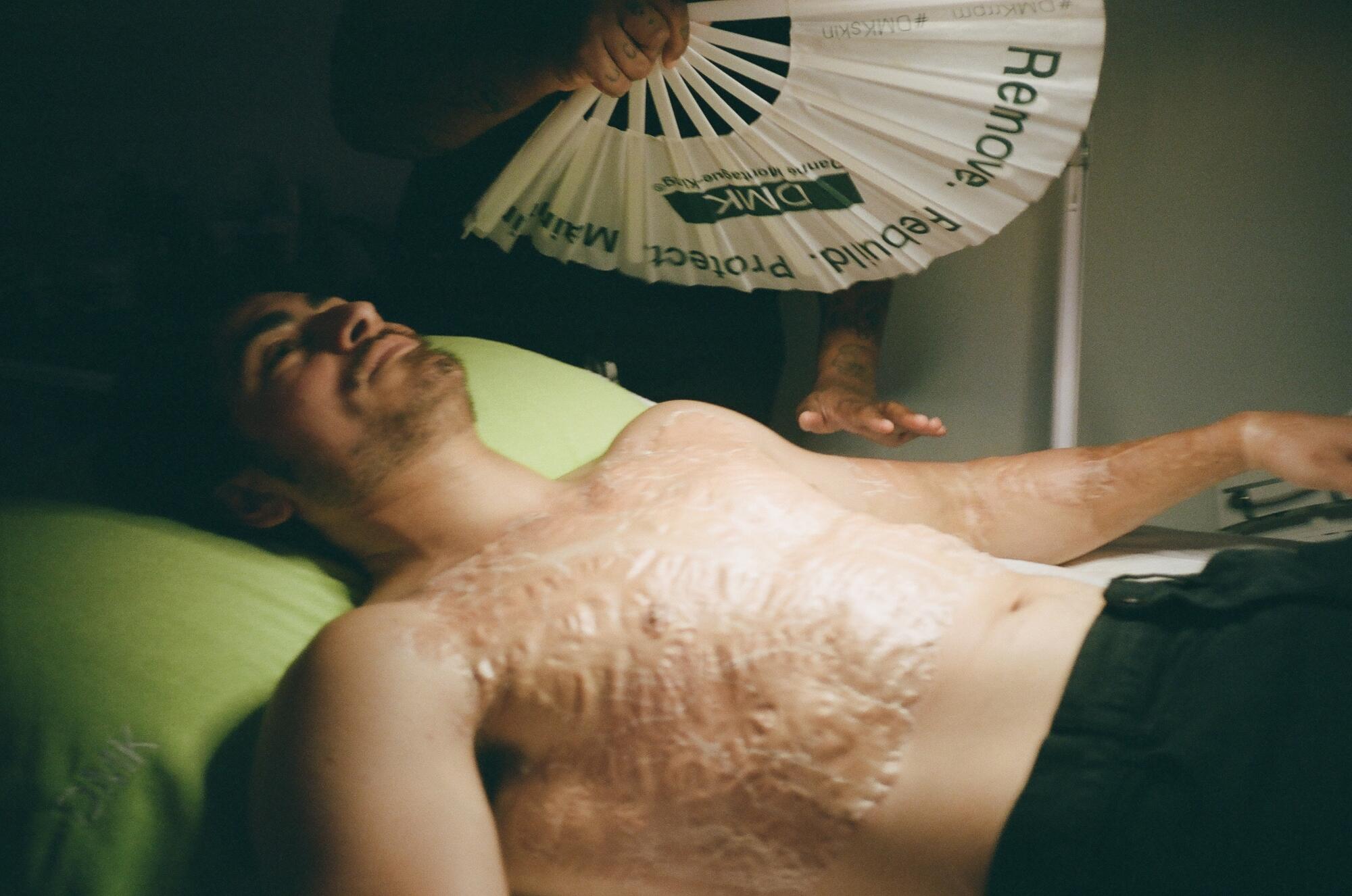
“I had a client who every time we were working on their acne, they would prepare me a meal,” Davis said. “If I could do this work for free, I absolutely would. But being in this industry is very expensive.”
Just as Davis has shown up for the community, it has shown up for her. After knee surgery last December, Davis had to take three months off from work and put up a GoFundMe after her disability claim was rejected. In less than a week, she was able to raise $10,000 to keep her business afloat.
Davis has big aspirations to continue growing her business into a larger, more inclusive space beyond the walls of her current 100-square-foot studio.
“My dream is to have a med spa where queer and trans people can go and get all the things done,” Davis said. In her future space, she wants trans women to come for electrolysis for hair removal and trans men to get gender-affirming tattoos for their chest scars. She wants a place where trans people “don’t have to worry about people not knowing or not wanting to treat them.”
Luxurious Chinese- and Japanese-inspired head spa treatments are all the rage in L.A. We share favorites, and what they offer.
In her line of work, it’s the relationships that continue to make her job meaningful and fuel her dreams. “I’m helping to heal people’s scars but I’m also healing a deep part of myself,” Davis said.
As Davis works with her clients, they share secrets, life stories, joys and anxieties and she doesn’t take that trust for granted. She still remembers the first time someone cried during treatment and she jokes that she’s also a part-time therapist.
Davis said she feels deep gratitude that she’s a part of people’s journeys toward living their fullest and authentic lives.
“Trans bodies are literally villainized — let me tenderly touch you,” Davis said. “To have someone who is touching you and loving you and caring for you as you are is really important … it is a necessary form of community, solidarity, support and care.”
More to Read
Sign up for The Wild
We’ll help you find the best places to hike, bike and run, as well as the perfect silent spots for meditation and yoga.
You may occasionally receive promotional content from the Los Angeles Times.

